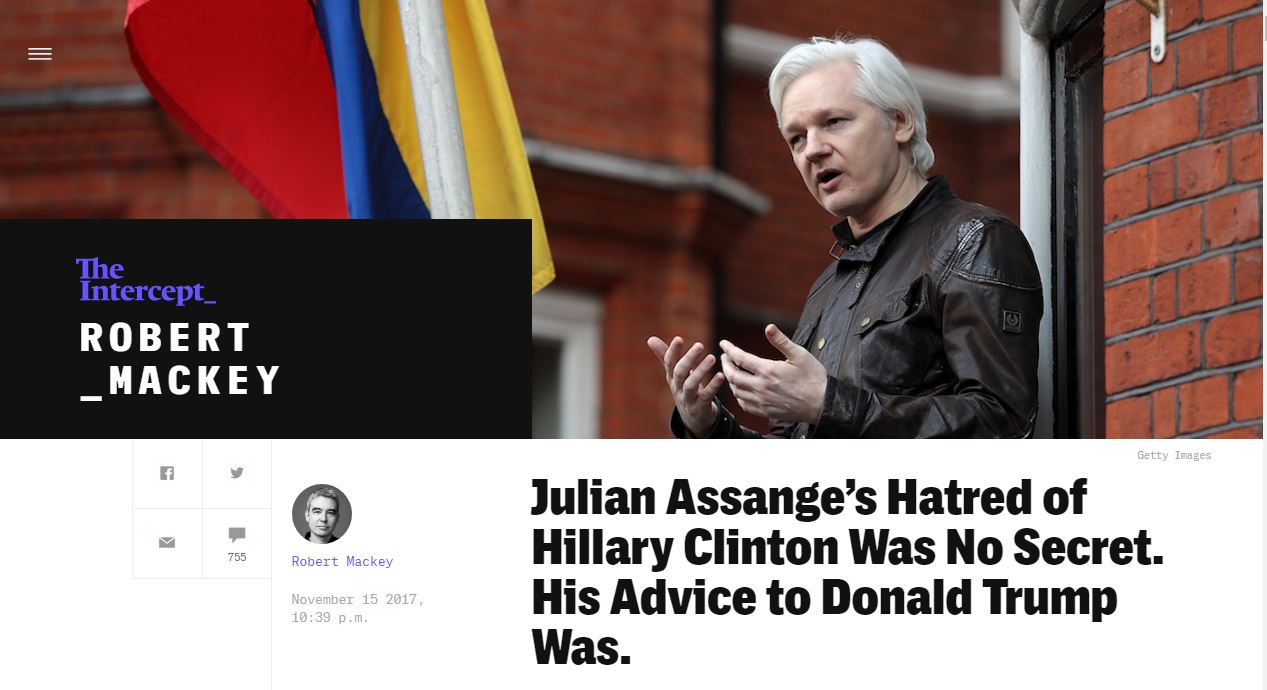The Intercept emerged during the Obama era to provide a service to whistleblowers. Journalist Glenn Greenwald, for example, helped form the Intercept in the aftermath of the corporate media backlash to Edward Snowden’s leaks about the massive surveillance machine possessed by the National Security Agency (NSA). The Intercept prided itself as a trustworthy source tailored to those interested in making state secrets a matter of public record. Then Donald Trump was elected and subtle changes to the content of the Intercept’s work became evident. By this time the Intercept was neither a safe for leaks nor a reliable source of journalism.
 On November 15th, the Intercept attacked WikiLeaks, the most well-known publisher of Washington’s dirty laundry.
On November 15th, the Intercept attacked WikiLeaks, the most well-known publisher of Washington’s dirty laundry.
The attack centered around WikiLeaks’s communication with Donald Trump Jr. According to the Intercept, WikiLeaks has “given ammunition” to detractors of the group through its direct contact with Trump Jr. over Twitter. The tweets, which revolved around the release of Trump’s tax documents, are supposedly proof that WikiLeaks “advised” the Trump Administration and is thus in cahoots with it. However, sources such as MSNBC, the New York magazine, and The Atlantic do not give the Intercept’s claims much credibility.
WikiLeaks’ request for Trump Jr. to release tax information could be seen as a strategic move to pressure the Administration to respond to the broader attack on WikiLeaks. The fact remains that at the time of the accusation (October 2016), Trump’s tax history was already being scrutinized by the corporate press. WikiLeaks was also being attacked by the corporate press for releasing Podesta’s emails, many of which revealed key policy blunders of the Obama-Clinton machine. The emails revealed that the DNC had in fact rigged the Democratic primary against Bernie Sanders among a sea of evidence of Clinton’s servitude to Wall Street. The author of the Intercept article fails to mention this context at all.
Omitting the importance of the information leaked by WikiLeaks regarding the Clinton machine lays bare the partisan character of the Intercept’s attack. And this is not the first time that the Intercept has damaged its journalistic reputation with partisan politics. The Intercept was implicated in the exposure of Reality Winner’s identity in the insubstantial leak regarding Russian interference in the 2016 elections. It also published an anti-Syria hit piece comparing President Assad to fascists. Most recently, the Intercept was found to have withheld important Snowden leaks that may have changed the course of the war in Syria.
These instances of the Intercept’s alignment with US imperialism raises many questions. First, what is it that prompts the media source from publishing articles that do nothing but aid the Democratic Party wing of the empire? And furthermore, how do the Intercept’s recent journalistic blunders fit into the broader historical moment? These questions are vitally important as they point to the necessary approach to handling contradictions. This particular point in history is characterized by a crisis in every facet of US imperialism, making independent journalism that much more important to the development of a movement that can seize the time.
It turns out that the Intercept’s status as an independent media source has always been up for debate. The popular media source is a subsidiary of First Look Media. First Look Media is a venture of Pierre Omidyar, the billionaire tech capitalist and founder of eBay. Omidyar is well known for his investments in the non-profit and NGO industries around the world. He is also a staunch Democrat. In the 2016 elections, Omidyar gave hefty donations to an anti-Trump Super PAC.
It should come as no surprise then that the Intercept provides stealth defense of the Democratic Party. The Democratic Party is arguably in a weaker position than it was last November when Donald Trump defeated Hillary Clinton. Top Democrats remain committed to the dying narrative that Russia influenced the 2016 elections in favor of Trump. Former DNC interim chair Donna Brazile confirmed the facts in the 2016 WikiLeaks dump that Hillary Clinton used the DNC to secure her nomination. Polls suggest that the Democratic Party may, in fact, be less popular than Donald Trump. That’s because the Democratic Party has nothing to offer the except anti-Russian hysterics and pro-corporate candidates.
A defense of WikiLeaks is not necessary then because the source of the attack is dubious at best and illegitimate at worst. WikiLeaks may have committed an error over Twitter by communicating with Trump Jr. If this is about political strategy, then one could make the argument that tweeting to the Trump Administration shows a level of opportunism to use the Trump Administration for its own ends. It isn’t as if Julian Assange wouldn’t have a reason to do whatever it takes to curry favor with the current Administration. Assange is a wanted man and would likely serve a life in federal prison if extradited from the Ecuadorian Embassy in London.
However politically flawed, WikiLeaks has done humanity a service by exposing the Democratic Party as but another organ of the rich. The Republican Party has long been known for its staunch support for the most egregious manifestations of white supremacy and capitalism. Donald Trump’s election was in part a rejection of the Republican Party elite. The Republican Party’s base refused to support Jeb Bush, Ted Cruz, or Marco Rubio. Trump took advantage of the chaos and won the Republican nomination, only to be confronted with a Democratic Party opposition in similar shape.
The role WikiLeaks played in the election cycle was thus a progressive one. Leaks such as Vault7 gave the masses an understanding of the Democratic Party’s true character. Clinton’s speeches to Wall Street, her “public” and “private” positions on Social Security, and her leadership in destroying Libya only added fuel to the fire sparked by the revelation that the Clinton campaign used the DNC to ensure its nomination. Any discussion about WikiLeaks cannot leave out the concrete developments that made the election so historic in the first place.
The enduring legacy of the 2016 elections is a reflection of the deep crisis that plagues US imperialism. Inequality continues to deepen, police repression continues to intensify, and a global confrontation with Russia and China remains a serious threat to the future of humanity. The Intercept’s decision to publish an attack on WikiLeaks is far more dangerous than the accusations leveled on WikiLeaks. It demonstrates a conscious neglect of progressive and radical politics in favor of the gossip that passes as news these days. The Trump-WikiLeaks connection has become just another talking point to draw readers into unsubstantiated conspiracies against the two-party elite.
This is not a time to pontificate Assange’s personal political views or those of WikiLeaks. WikiLeaks cannot not drive a new movement for social transformation, only the people can. Still, it is a crime to negate the objective impact of WikiLeaks in weakening the Democratic Party. The Democratic Party is the greatest obstacle to forging a real struggle against war, austerity, and racism in our time. Criticism of WikiLeaks that leaves out this critical point amounts to tacit support for the Democrats. And the Intercept’s criticism is just one example of a longer trend that shows just what kind of influence Democratic Party donor and billionaire Pierre Omidyar has on the organization.
Top photo | Supporters watch a video conference of WikiLeaks founder Julian Assange outside the public university in Barcelona, Spain, Tuesday, Sept. 26, 2017. (AP/Manu Fernandez)


